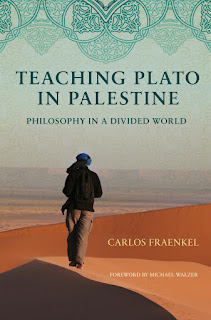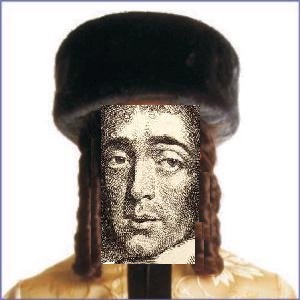Spinoza lezen in Palestina
Het recente boek van Carlos Fraenkel, Teaching Plato in Palestine: Philosophy in a Divided World. Princeton University Press (May 4, 2015, books.google en cf. Fraenkels website), doet mij denken aan een blog dat ik zes jaar geleden schreef: “Spinoza lezen in Teheran.”
Fraenkel, die hier in meerdere blogs voorkomt [cf. o.a.], beschrijft zijn ervaringen over het doceren van filosofie in situaties waar studenten vooral in woelige tijden zoeken naar praktische bruikbaarheid van wat ze te leren krijgen.
 Teaching Plato in Palestine is part intellectual travelogue,
part plea for integrating philosophy into our personal and public life.
Philosophical toolkit in tow, Carlos Fraenkel invites readers on a tour around
the world as he meets students at Palestinian and Indonesian universities,
lapsed Hasidic Jews in New York, teenagers from poor neighborhoods in Brazil,
and the descendants of Iroquois warriors in Canada. They turn to Plato and
Aristotle, al-Ghazâlî and Maimonides, Spinoza and Nietzsche for help to tackle
big questions: Does God exist? Is piety worth it? Can violence be justified?
What is social justice and how can we get there? Who should rule? And how shall
we deal with the legacy of colonialism? Fraenkel shows how useful the tools of
philosophy can be—particularly in places fraught with conflict—to clarify such
questions and explore answers to them. In the course of the discussions,
different viewpoints often clash. That’s a good thing, Fraenkel argues, as long
as we turn our disagreements on moral, religious, and philosophical issues into
what he calls a “culture of debate.” Conceived as a joint search for the truth,
a culture of debate gives us a chance to examine the beliefs and values we were
brought up with and often take for granted. It won’t lead to easy answers,
Fraenkel admits, but debate, if philosophically nuanced, is more attractive
than either forcing our views on others or becoming mired in multicultural
complacency—and behaving as if differences didn’t matter at all.
Teaching Plato in Palestine is part intellectual travelogue,
part plea for integrating philosophy into our personal and public life.
Philosophical toolkit in tow, Carlos Fraenkel invites readers on a tour around
the world as he meets students at Palestinian and Indonesian universities,
lapsed Hasidic Jews in New York, teenagers from poor neighborhoods in Brazil,
and the descendants of Iroquois warriors in Canada. They turn to Plato and
Aristotle, al-Ghazâlî and Maimonides, Spinoza and Nietzsche for help to tackle
big questions: Does God exist? Is piety worth it? Can violence be justified?
What is social justice and how can we get there? Who should rule? And how shall
we deal with the legacy of colonialism? Fraenkel shows how useful the tools of
philosophy can be—particularly in places fraught with conflict—to clarify such
questions and explore answers to them. In the course of the discussions,
different viewpoints often clash. That’s a good thing, Fraenkel argues, as long
as we turn our disagreements on moral, religious, and philosophical issues into
what he calls a “culture of debate.” Conceived as a joint search for the truth,
a culture of debate gives us a chance to examine the beliefs and values we were
brought up with and often take for granted. It won’t lead to easy answers,
Fraenkel admits, but debate, if philosophically nuanced, is more attractive
than either forcing our views on others or becoming mired in multicultural
complacency—and behaving as if differences didn’t matter at all.
 Hoofdstuk drie draagt de titel "Spinoza in Shtreimels. An
Underground Seminar." Daarover een recensent gisteren: “In a chapter titled “ Spinoza in
Shtreimels,” Mr. Fraenkel confronts a different kind of fear. Borrowing a
phrase from the historian Yirmiyahu Yovel, he calls the ultra-Orthodox students
of his clandestine seminar, conducted in a lounge in SoHo, “modern-day Marranos
of reason: God-fearing Jews in public, freethinkers in secret.” Together they
read the heretical Jewish philosopher Spinoza and the 11th-century Muslim
thinker al-Ghazali, both of whom suffered a crisis of faith. Here philosophy
represents a theological threat more than a political one. “From the point of
view of our community,” one of his students says, “studying these books is much
worse than having an extramarital affairs or going to a prostitute. That’s
weakness of the flesh, but here our souls are on the line.”
Hoofdstuk drie draagt de titel "Spinoza in Shtreimels. An
Underground Seminar." Daarover een recensent gisteren: “In a chapter titled “ Spinoza in
Shtreimels,” Mr. Fraenkel confronts a different kind of fear. Borrowing a
phrase from the historian Yirmiyahu Yovel, he calls the ultra-Orthodox students
of his clandestine seminar, conducted in a lounge in SoHo, “modern-day Marranos
of reason: God-fearing Jews in public, freethinkers in secret.” Together they
read the heretical Jewish philosopher Spinoza and the 11th-century Muslim
thinker al-Ghazali, both of whom suffered a crisis of faith. Here philosophy
represents a theological threat more than a political one. “From the point of
view of our community,” one of his students says, “studying these books is much
worse than having an extramarital affairs or going to a prostitute. That’s
weakness of the flesh, but here our souls are on the line.”
Aanvulling 8 juli 2015: ik ontdek zojuist dat dit hoofdstuk, "Spinoza in Shtreimels. An Underground Seminar", door Carlos Fraenkel in de herfst van 2012 in The Jewish Review of Books is geplaatst.
_________
 De shtreimel
of sjtreimel is het harige hoofddeksel dat chassidische joden op Sabbat en op
feestdagen dragen [cf.]
De shtreimel
of sjtreimel is het harige hoofddeksel dat chassidische joden op Sabbat en op
feestdagen dragen [cf.]

